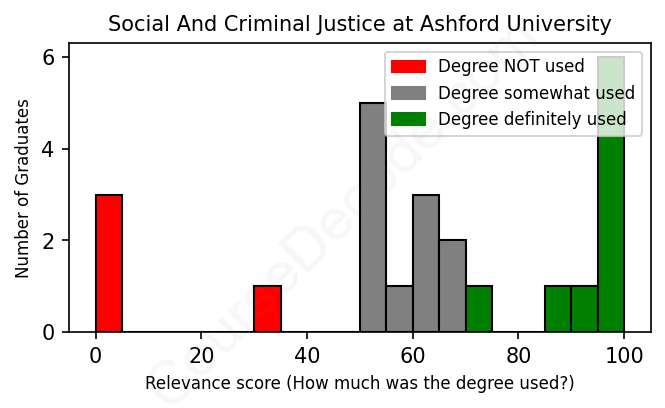
First, some facts. Of the Social And Criminal Justice graduates from Ashford University we've analyzed , here's how many have used (or NOT used) their degree in their career:

These are estimates based on AI analysis of 24 LinkedIn profiles (see below).
The verdict? Slightly below average. Overall, with an average relevance score of 62%, Social And Criminal Justice graduates from Ashford University have a slightly lower likelihood (-5%) of finding work in this field compared to the average graduate across all fields:
And for comparison, here's the chart for all profiles we've looked at across all degrees.
Also, after graduating, only 25% of these graduates have pursued further education other than another Bachelor's degree (such as a Masters degree or other), compared to the average across all profiles of 35%. This suggests a Bachelors degree is enough for most Social And Criminal Justice graduates, and it's normal to look for work straight after graduation.
See the details:
|
Relevance score: 71% We think this person has gone into a career highly relevant to their degree. We think this person has gone into a career highly relevant to their degree.
DEGREE INFOGraduated in 2011 from Ashford University with a Bachelors Degree in Social And Criminal Justice. No other secondary education since. JOB HISTORY SINCE GRADUATIONStudent Relations Technician Desert Sands Charter High Schl Jul 2014 - Mar 2015 Tech Tutor  Assurance Learning Academy Mar 2015 - Present CTE Information Technology Teacher  Desert Sands Charter School 2016 - Present ABOUTNo information provided. |
The top 10 most common jobs done by the graduates we've analyzed (ranked most common to least) are:
When looking at the careers of graduates from Ashford University with a degree in Social and Criminal Justice, it seems that many have gravitated towards roles directly connected to law enforcement and public safety. Common positions include police officers, deputies, border patrol agents, and various roles within emergency management. These jobs typically require a solid understanding of criminal justice principles, making them highly relevant to the skills and knowledge gained through their degrees. For example, the positions of Deputy Sheriff and Police Officer heavily rely on the competencies taught in Social and Criminal Justice programs.
However, not all graduates have found themselves in roles that directly leverage their degree. Some have taken up jobs in unrelated fields like IT management, business operations, or administrative roles, which often don’t utilize the specific skills learned during their studies in social and criminal justice. While positions such as project management or counseling may touch on broader social justice concepts, they don’t always apply the core elements of criminal justice theory. So, while many alumni are indeed in jobs relevant to their major, there’s a significant number that has veered off into unrelated fields, demonstrating a mixed relevance of their education to their professional paths.
Here is a visual representation of the most common words in job titles for Social And Criminal Justice graduates (this is across all Social And Criminal Justice graduates we've analyzed, not just those who went to Ashford University):

Looking at the career paths of Ashford University graduates with degrees in Social and Criminal Justice, there's a mix of outcomes that give us some insight into their trajectories. Right after graduation, many of them often take on roles related to law enforcement and security, such as police officers, border patrol agents, and security officers. It seems like a solid number of graduates find their way into relevant jobs that tie back to their degree, suggesting they have a clear direction in public safety and criminal justice sectors. For instance, some started awesome careers as police officers or in emergency management positions that align nicely with their studies.
As time rolls on—around five to ten years later—there's a noticeable trend where a good chunk of these graduates stay within law enforcement or advanced roles in related fields. Many have progressed into leadership or specialized roles, like supervisors or managers in security and emergency management. However, not everyone sticks strictly to criminal justice-related jobs; some have transitioned into completely different areas, such as education or corporate environments, which might make you think about the flexibility of such a degree. Overall, while many graduates clearly have found meaningful roles connected to Social and Criminal Justice, there are also a fair amount who have ventured into unrelated fields, showing that the path isn’t always straightforward for everyone, but it can lead to diverse opportunities.
Honestly, a Bachelor’s degree in Social and Criminal Justice can swing from pretty manageable to a bit challenging, depending on how you take it. At Ashford University, since they offer a lot of online classes, you might find it a bit easier to juggle your time, but you still have to keep up with readings, discussions, and assignments. The material can be interesting and engaging, but it also requires critical thinking, especially when diving into complex issues about law and society. If you're motivated and stay organized, you might find it falls on the easier side of the spectrum compared to other degrees like engineering or science. Just remember that it’s not a walk in the park either, so be ready to put in some effort!
Most commonly, in the LinkedIn profiles we've looked at, it takes people 2 years to finish a Bachelor degree in Social And Criminal Justice.
When you check out the job history of these Social and Criminal Justice grads from Ashford University, it seems like they have mostly found decent-paying jobs, especially in law enforcement and emergency management roles. For instance, positions like Chief Executive Officer, Deputy Directors, and Border Patrol Agents typically come with pretty good salaries. However, some of the earlier roles, like security officer or administrative assistant, might not be as lucrative, but they can serve as stepping stones to better opportunities. Overall, many of these alumni are moving into positions that likely pay pretty well, especially as they gain experience and take on more responsibility in their careers. So yeah, it looks like they’re doing alright financially!
Here is a visual representation of the most common words seen in the "about" section of LinkedIn profiles who have a Bachelor degree in Social And Criminal Justice (this is across all Social And Criminal Justice graduates we've analyzed, not just those who went to Ashford University). This may or may not be useful:

Here are all colleges offering a Bachelor degree in Social And Criminal Justice (ordered by the average relevance score of their Social And Criminal Justice graduates, best to worst) where we have analyzed at least 10 of their graduates:
| College | Score | Count |
|---|---|---|
 Ashford University Ashford University
|
62 | 24 |